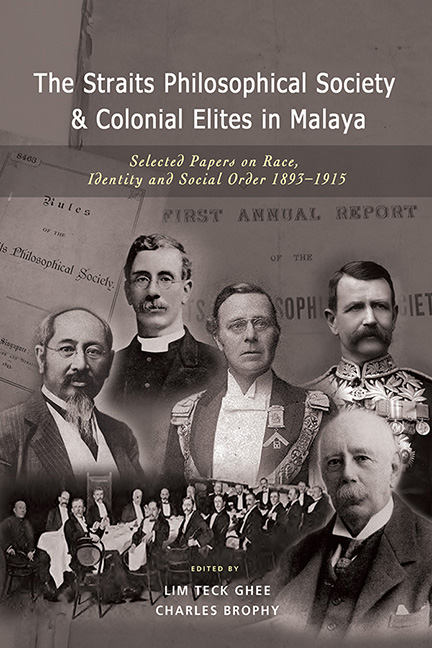 The Straits Philosophical Society and Colonial Elites in Malaya
The Straits Philosophical Society and Colonial Elites in Malaya 16 - Chinese Local Trade
Published online by Cambridge University Press: 09 January 2024
Summary
Editors’ Note
Alongside Lim Boon Keng, Tan Teck Soon was the other prominent, and longest serving, Straits Chinese voice in the Society. In their contributions, both challenged the less than liberal and often stereotyped views of the Chinese held amongst some prominent members of the Society (see Section 2). Although Tan’s main intellectual interests were focused on cultural and educational concerns related to Chinese and Western societies, this atypical presentation sought to share with his European audience insights into the Chinese conduct of enterprise and business—both the positive and negative aspects. The essay is noteworthy in outlining the case made by the acculturated English-speaking Straits Chinese elite which not only saw themselves a match in educational and social achievement with the British but also felt it necessary to emphasize the economic contribution the Chinese had made to Malaya. The Chinese, Tan argued, had developed the land of the Malay States at a time when the British had avoided intervention and had worked to facilitate trade into the interior, often in precarious circumstances and without government protection. Coinciding with the growth of Chinese nationalism amongst the overseas Chinese in Malaya, Tan, who had been educated in China and whose writings reflected upon the rise of a modern China, highlighted the importance of the China trade to the Peninsula and the difficulties faced by the trading community. Responding to the paper, J.M. Allison, a member of the Legislative Council and a manager of Barlow & Co, prominently involved in the rubber trade, had little sympathy for what he saw as Tan’s “exaggerated account” of the plight of Chinese traders. Disputing various points in the presentation relating to the contribution of Chinese traders and the Chinese population as a whole in Singapore, his main counter argument was to emphasize that Tan overlooked the benefits of trade under the British flag which provided the basis of prosperity for the trader and the colony.
In endeavouring to write an essay dealing with Chinese local trade for discussion at a meeting of this Society, I must first apologize for introducing into our syllabus a subject to which some objection could justly be made as hardly coming within the scope of the Society’s aims and objects as evidenced by its rules.
- Type
- Chapter
- Information
- The Straits Philosophical Society and Colonial Elites in MalayaSelected Papers on Race, Identity and Social Order 1893-1915, pp. 233 - 246Publisher: ISEAS–Yusof Ishak InstitutePrint publication year: 2023
